Wild Bill Hickok from Wikipedia,
the free encyclopedia
| James Butler Hickok (May 27, 1837
– August 2, 1876), better known as Wild Bill Hickok, was a legendary figure
in the American Wild West. He is perhaps the best known figure from that
era. After fighting in the Union army during the American Civil War, he
became a legendary army scout, and later, lawman and gunfighter.
Hickok was born in Troy Grove, Illinois
on May 27, 1837. He left his father's farm in 1855 to be a stage coach
driver on the Santa Fe and Oregon Trails. His gunfighting skills led to
his nickname, "Wild Bill".
Born May 27, 1837
Troy Grove, Illinois, USA
Died August 2, 1876
Deadwood, South Dakota, USA
Occupation: Lawman, Gunfighter,
Gambler |
Wild Bill Hickok
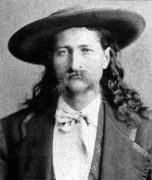 |
- - - - - - - - - - - - - - - - - -
- - - - - - - - - - - - - - - - - - - - - - - - - - - - - - - - - - - -
- - - - - - - - - - - - - - - - -
Early years as a lawman, "posting"
men out of town
In 1857, he claimed a 160 acre tract
of land in Johnson County, Kansas (in what is now the city of Lenexa) where
he became the first constable of Monticello Township, Kansas. In 1861,
he became a town constable in Nebraska. He became well-known for single-handedly
capturing the McCanles gang at Rock Creek Station through the use of force.
On several other occasions, Hickok confronted and killed several men while
fighting alone. [1]
Hickok invented the concept of "posting"
men out of town. He would put a list on what was called the "dead man's
tree" (men had been lynched on it) while constable of Monticello Township.
Hickok proclaimed he would shoot them on sight the following day. Few stayed
around to find out if he was serious.
- - - - - - - - - - - - - - - -
- - - - - - - - - - - - - - - - - - - - - - - - - - - - - - - - - - - -
- - - - - - - - - - - - - - - - - - -
Civil War and Scouting
When the American Civil War began,
Hickok joined the Union forces and served in the west, mostly in Kansas
and Missouri. He earned a reputation as a skilled scout. After the war,
Hickok became a scout for the U. S. Army and later was a professional gambler.
He served for a time as a United States Marshal. In 1867, his fame increased
from an interview by Henry Morton Stanley. Hickok's killing of Whistler
the Peacemaker with a long-range rifle shot had influence in preventing
the Sioux from uniting to resist the settler incursions into the Black
Hills. That rifle shot, supposedly downhill on a windy day and reportedly
at over 750 yards, helped cement Hickok's legend as a master of weapons.
- - - - - - - - - - - - - - - -
- - - - - - - - - - - - - - - - - - - - - - - - - - - - - - - - - - - -
- - - - - - - - - - - - - - - - - - -
Later Career as a Lawman/Gunfighter
On July 21, 1865, in the town square
of Springfield, Missouri, Hickok killed Davis K. Tutt, Jr. in a "quick
draw" duel. Fiction would later show this kind of gunfight as typical,
but Hickock's is in fact the only one on record that fits the portrayal.
The incident was precipitated by a dispute over a gambling debt incurred
at a local saloon.
While Sheriff/City Marshal of Hays,
Kansas on July 17, 1870, he was involved in a gunfight with disorderly
soldiers of the 7th US Cavalry, wounding one and mortally wounding another.
In 1871, Hickok became marshal of Abilene, Kansas, taking over for former
Marshal Bear River [Thomas J. Smith]. Hickok's encounter in Abilene with
outlaw John Wesley Hardin resulted in the latter fleeing the town after
Hickok managed to disarm him.
While working in Abilene, Hickok
and Phil Coe, a saloon owner, had an ongoing dispute that later resulted
in a shootout. Coe had been the business partner of known gunman Ben Thompson,
with whom he co-owned the "Bulls Head Saloon". On October 5, 1871 Hickok
was standing off a crowd during a street brawl, during which time Coe fired
two shots at Hickok, resulting in Hickok shooting and killing Coe. Hickok,
whose eyesight was poor by that time in his life due to the early stages
of glaucoma, caught the glimpse of movement of someone running toward him.
He quickly fired one shot in reaction, accidentally shooting and killing
Abilene Special Deputy Marshal Mike Williams, who was coming to his aid,
an event that would haunt him for the remainder of his life. [2] Hickok
was said to have met and been acquainted with later famous lawman Wyatt
Earp, by Earp's biographer. However, if they met, Hickok never gave any
account of it.
- - - - - - - - - - - - - - - -
- - - - - - - - - - - - - - - - - - - - - - - - - - - - - - - - - - - -
- - - - - - - - - - - - - - - - - - -
Buffalo Bill
Some accounts of Hickok report him
as taking part in Buffalo Bill's Wild West; however, that production was
not in existence prior to 1882, well after Hickok's death. Nonetheless,
Hickok was reported by some to have appeared with Buffalo Bill in 1873
in a stage play titled "Scouts of the Plains".
- - - - - - - - - - - - - - - -
- - - - - - - - - - - - - - - - - - - - - - - - - - - - - - - - - - - -
- - - - - - - - - - - - - - - - - - -
Wagon train venture, Calamity
Jane
Hickok joined Charlie Utter's July,
1876, wagon train from Colorado to Deadwood, South Dakota, in which Utter
made Hickok a partner, having known Hickok for quite some time, and linking
up with him when the wagon train passed through Cheyenne, Wyoming. Hickok
would act as scout, and help lead the wagon train through any troubles
they might run across while en route. The goal, which was successful, was
to ship gamblers, prostitutes, and other needed commodities to the recent
boom town. During the planning and organization of that trip, and the actual
trip up itself, Hickok first met Calamity Jane.
She would later claim that they
had a romantic relationship, and claimed to have been one of Hickok's closest
friends, but in reality, they barely knew one another, having met only
a month or a little more before his death, and although Hickok by all reports
was friendly toward her, there was nothing beyond casual hellos and goodbyes.
Also, Hickok had only recently married, and by all accounts he was completely
taken by his wife.
- - - - - - - - - - - - - - - -
- - - - - - - - - - - - - - - - - - - - - - - - - - - - - - - - - - - -
- - - - - - - - - - - - - - - - - - -
"Dimestore novel" fame
It is difficult to separate the
truth from fiction about Hickok, the first "dime novel" hero of the western
era, in many ways one of the first comic book heroes, keeping company with
another who achieved part of his fame in such a way, frontiersman Davey
Crockett. In the "dime store novels", exploits of Hickok were layed out
in heroic form, making him often seem larger than life. In truth, most
of the stories were at the very least greatly exaggerated, and in many
cases, complete fabrication.
Hickok himself told the writers
with great seriousness that he had killed over 100 men. This number is
doubtful, and it is more likely that his total killings would be around
20 or slightly more, still a high number of men to have killed. There is
no doubt that Hickok was a fearless and deadly fighting man, equally at
home with a rifle, revolver, or knife. His story of fighting a grizzly
bear, which he claims mistook him for food due to his greasy buckskins,
personified a man who feared nothing alive, and after emptying his pistols
into the bear, killed it with a bowie knife. That story, also, is thought
to have been an exaggeration, but nonetheless an enjoyable tale.
- - - - - - - - - - - - - - - -
- - - - - - - - - - - - - - - - - - - - - - - - - - - - - - - - - - - -
- - - - - - - - - - - - - - - - - - -
Death
On August 2, 1876, while playing
poker at Nuttal & Mann's "Saloon No. 10" in Deadwood (then part of
the Dakota Territory but on Indian land), Hickok could not find an empty
seat in the corner, where he always sat in order to protect himself against
sneak attacks from behind, and instead sat with his back to the door; unfortunately,
his previous caution proved wise, as he was shot in the back of the head
with a .45-caliber revolver by Jack McCall. Legend has it that Hickok's
hand in poker was a Pair of Aces, and a pair of Eights, with the fifth
card disputed. The fifth card was either unknown, or some say that it was
not dealt yet, and the game was interrupted by Hickok getting shot.
The motive for the killing is still
debated. McCall may have been paid for the deed, it may have just been
the result of a recent dispute. But most likely, McCall, in a drunken rage,
became enraged over what he perceived as a condescending offer from Hickok
to let him have enough money for breakfast after he had lost all his money
playing poker the previous day. McCall claimed at the resulting two-hour
trial (by a motley group of assembled miners and businessmen) that he was
avenging Hickok's earlier slaying of his brother and was acquitted, resulting
in the Black Hills Pioneer editorializing:
"Should it ever be our misfortune
to kill a man ... we would simply ask that our trial may take place in
some of the mining camps of these hills"
McCall was subsequently rearrested
after bragging about his deed, and a new trial was held. The authorities
did not consider this to be double jeopardy because Deadwood at the time
was an illegal city due to several laws that made it against the law to
settle on Indian land, although many people did anyway. The new trial was
held in American territory, in Yankton, South Dakota. Hickok's brother,
Lorenzo Butler Hickok, traveled from Illinois to attend the retrial. This
time McCall was found guilty and hanged. After his execution it was determined
that McCall had never even had a brother.
Utter claimed Hickok's body, and
placed a notice in the local newspaper, the Black Hills Pioneer, which
read:
"Died in Deadwood,
Black Hills, August 2, 1876, from the effects of a pistol shot, J. B. Hickok
(Wild Bill) formerly of Cheyenne, Wyoming. Funeral services will be held
at Charlie Utter's Camp, on Thursday afternoon, August 3, 1876, at 3 o'clock,
P. M. All are respectfully invited to attend."
Almost the entire town attended
the funeral, and Utter had Hickok buried with a wooden grave marker reading:
"Wild Bill, J. B. Hickok killed
by the assassin Jack McCall in Deadwood, Black Hills, August 2d, 1876.
Pard, we will meet again in the happy hunting ground to part no more. Good
bye, Colorado Charlie, C. H. Utter."
At the urging of Calamity Jane,
Utter in 1879 had Hickok reinterred in a ten foot square plot at the Mount
Moriah Cemetery, surrounded by a cast-iron fence with an American flag
flying nearby. A monument has since been built there. In accordance with
her dying wish, Calamity Jane was buried next to him
Shortly before Hickok's death, he
wrote a letter to his new wife, which reads in part: "Agnes Darling, if
such should be we never meet again, while firing my last shot, I will gently
breathe the name of my wife—Agnes—and with wishes even for my enemies I
will make the plunge and try to swim to the other shore" and "My dearly
beloved if I am to die today and never see the sweet face of you I want
you to know that I am no great man and am lucky to have such a woman as
you"
|
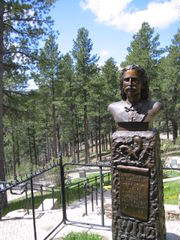
Gravesite
.
.
.
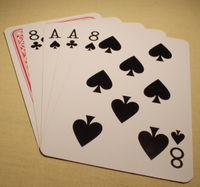
"Dead man's hand"
|
McCall was subsequently rearrested
after bragging about his deed, and a new trial was held. The authorities
did not consider this to be double jeopardy because Deadwood at the time
was an illegal city due to several laws that made it against the law to
settle on Indian land, although many people did anyway. The new trial was
held in American territory, in Yankton, South Dakota. Hickok's brother,
Lorenzo Butler Hickok, traveled from Illinois to attend the retrial. This
time McCall was found guilty and hanged. After his execution it was determined
that McCall had never even had a brother.
Utter claimed Hickok's body, and
placed a notice in the local newspaper, the Black Hills Pioneer, which
read:
"Died in Deadwood,
Black Hills, August 2, 1876, from the effects of a pistol shot, J. B. Hickok
(Wild Bill) formerly of Cheyenne, Wyoming. Funeral services will be held
at Charlie Utter's Camp, on Thursday afternoon, August 3, 1876, at 3 o'clock,
P. M. All are respectfully invited to attend."
Almost the entire town attended
the funeral, and Utter had Hickok buried with a wooden grave marker reading:
"Wild Bill, J.
B. Hickok killed by the assassin Jack McCall in Deadwood, Black Hills,
August 2d, 1876. Pard, we will meet again in the happy hunting ground to
part no more. Good bye, Colorado Charlie, C. H. Utter."
At the urging of Calamity Jane,
Utter in 1879 had Hickok reinterred in a ten foot square plot at the Mount
Moriah Cemetery, surrounded by a cast-iron fence with an American flag
flying nearby. A monument has since been built there. In accordance with
her dying wish, Calamity Jane was buried next to him
Shortly before Hickok's death, he
wrote a letter to his new wife, which reads in part: "Agnes Darling, if
such should be we never meet again, while firing my last shot, I will gently
breathe the name of my wife—Agnes—and with wishes even for my enemies I
will make the plunge and try to swim to the other shore" and "My dearly
beloved if I am to die today and never see the sweet face of you I want
you to know that I am no great man and am lucky to have such a woman as
you"
- - - - - - - - - - - - - - - -
- - - - - - - - - - - - - - - - - - - - - - - - - - - - - - - - - - - -
- - - - - - - - - - - - - - - - - - -
Media
Over the years, Hickok has been
the subject of various Television Programs, Movies and Books. Some of which
are listed below.
- - - - - - - - - - - - - - - -
- - - - - - - - - - - - - - - - - - - - - - - - - - - - - - - - - - - -
- - - - - - - - - - - - - - - - - - -
Television
* Was portrayed
by Josh Brolin in the 1989-1992 television series The Young Riders.[1]
* Featured in
the 1995 series Legend (TV series), episode 1.06 The Life, Death and Life
of Wild Bill Hickok. The episode portrays his death factually, but then
goes on to show that he faked his own death (wearing a sort of bullet-proof
vest), so that he could retire peacefully.
* The last days
of Hickok's life are dramatized in the HBO TV series Deadwood.[2], in which
he is portrayed by Keith Carradine.
- - - - - - - - - - - - - - - -
- - - - - - - - - - - - - - - - - - - - - - - - - - - - - - - - - - - -
- - - - - - - - - - - - - - - - - - -
Movies
* Played by Gary
Cooper in the 1936 film The Plainsman, featuring Jean Arthur as Calamity
Jane and directed by Cecil B. DeMille.
* Portrayed
by Jeff Bridges in the 1995 movie Wild Bill.[4]
* Howard Keel
played him in the 1953 film Calamity Jane[5]
* Jeff Corey
portrayed him in the 1970 Dustin Hoffman movie Little Big Man.
- - - - - - - - - - - - - - - -
- - - - - - - - - - - - - - - - - - - - - - - - - - - - - - - - - - - -
- - - - - - - - - - - - - - - - - - -
Novels
* The Memoirs
of Wild Bill Hickok, Richard Matheson, ISBN 0515117803
- - - - - - - - - - - - - - - -
- - - - - - - - - - - - - - - - - - - - - - - - - - - - - - - - - - - -
- - - - - - - - - - - - - - - - - - -
Poker
* Was inducted
into the Poker Hall of Fame in 1979.
* A hand of
two pair, aces and eights, is called a "Dead Man's Hand". According to
legend, it was the hand Hickok held when he was shot. No contemporary cite
for his hand has ever been found, according to Rosa, a biographer.
- - - - - - - - - - - - - - - -
- - - - - - - - - - - - - - - - - - - - - - - - - - - - - - - - - - - -
- - - - - - - - - - - - - - - - - - -
Trivia
* Hickok's death
chair is now in a glass case above the saloon entrance, though the saloon
itself was moved after the original Nuttall & Mann's #10 saloon burned
down; the original site is down the street to the north, about a block
away.
* Was a Roman
Catholic.
* Preferred
the cap and ball Colt 1851 .36 Navy Model
* Wore his revolvers
in reverse at his hips, sometimes in a red sash, having to draw from the
inside.
* Although Hickok
never drew "cross draw", he was a master of it. Hickok usually drew from
the right hip with right hand and the left hip with left hand, claiming
it was faster that way.
From Wikipedia,
the free encyclopedia
used with copyright
and copyleft as per Wikipedia permission agreements
If you would like to read more try
Chronology
on Life of James Butler (Wild Bill) HICKOK by John Richard
|
| The International Rifle Match
Harper's Weekly, New York, Saturday, October 10, 1874
No event in the sporting world has
excited more general attention this season than the grand International
Rifle Match at Creedmoor, Long Island, between the American and Irish "teams."
The latter arrived in this city on the 16th of September, and since that
time have occupied themselves in viewing the sights of the New World and
preliminary practice at Creedmoor. The party includes Major Arthur Blennerhassett
Leech, head of the Irish Rifle Association about ten years since, Mr. H.H.
Foster, Honorary Secretary of the Association, Mr. John Rigby, the maker
of the rifle the team are engaged in introducing, Dr. J.B. Hamilton, Mr.
James Wilson, Mr. J.K. Milner, Mr. Edmund Johnson, and Captain P. Walker.
The party were accompanied by the Lord Mayor of Dublin, who has come to
this country to see the shooting at Creedmoor, and afterward to indulge
in a few weeks' sport on the great plains of the West.
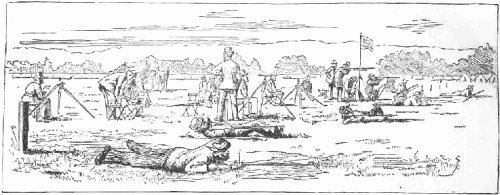
We give above an illustration showing
the last practice of the two teams at Creedmoor, two days before the match
took place. |
.
The American team were Mr. Henry
Fulton, Mr. H.A. Gildersleeve, Mr. T.S. Dakin, Mr. G.W. Yale, Colonel John
Bodine, and Mr. L.L. Hepburn. Mr. Fulton is a Lieutenant in the Twelfth
Regiment, is twenty-eight years old, and served in the army during the
war. He won several prizes at Montreal at the last meeting of the Quebec
Rifle Association, as did also Messrs. Gildersleeve and Yale. Mr. Gildersleeve
is Lieutenant-Colonel of the Twelfth Regiment, is thirty-three years old,
enlisted in the One Hundred and Fiftieth Regiment during the war, fought
at Gettysburg, was with Sherman on his march to the sea, serving the latter
part of the war as Provost Marshal of the Twentieth Army Corps. Mr. Dakin
is a Brigadier-General in the New York militia, is forty-three years old,
weighs 220 pounds, is a good shot, and has seen service during the war.
Mr. Hepburn is forty-two years old, a gun-maker, employed in the rifle-works
of E. Remington & Sons, Ilion, New York. Mr. Yale is also a gun-maker,
and is superintendent of Sharp's rifle-works, Hartford, Connecticut. He
is forty-eight years old. The two latter gentlemen have had great experience
with rifles. Colonel Bodine lives in Highland, New Jersey. He is an old
rifleman and a good shot. Mr. G.W. Wingate, who was chosen Captain of the
team, is a lawyer, a Colonel in the militia, President of the Amateur Rifle
Club, and has taken an active part in the rifle-shooting at Creedmoor.
A beautiful silver cup which Captain
Leech has brought over to present for competition to the riflemen of America
is illustrated. It is a very graceful and artistic piece of workmanship,
tastefully embossed, and surmounted by a representation of an ancient castle
in ruin. It bears the following inscription:
PRESENTED
FOR COMPETITION
TO THE RIFLEMEN OF AMERICA
BY
ARTHUR BLENNERHASSETT LEECH,
CAPTAIN OF THE IRISH INTERNATIONAL
TEAM OF RIFLEMEN,
ON THE OCCASION OF THEIR VISIT
TO NEW YORK,
1874 |
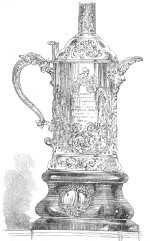 |
The day appointed for the grand match,
September 26, was every thing that could be desired, and the grounds at
Creedmoor wore a gala-day appearance. From 8000 to 10,000 visitors were
on the spot, and American and Irish flags were numerously displayed. The
utmost good feeling prevailed during the entire contest. The shooting began
at half past ten, at 800 yards, and was extraordinary for precision and
for the evenness of skill displayed by the several members of the two teams.
So well matched were the contestants that it was not decided which party
would win until Colonel Bodine, of the American team, delivered the last
shot, making a bull's-eye and winning for his party by three points. The
following table shows the score of each team:
TOTALS OF AMERICAN SCORES
Henry Fulton
G.W. Yale
John Bodine
Colonel Gildersleeve
L.L. Hepbum
T.S. Dakin |
171
162
158
155
149
139 |
| Grand Total |
934 |
|
TOTAL OF IRISH SCORES
John Rigby
J.B. Hamilton
James Wilson
J.K. Milner
Captian Walker |
163
160
160
154
150
144 |
| Grand Total |
931 |
|
At the termination of the shooting
at 800 yards, luncheon was served, and prior to the resuming of the match,
Major Leech, of the Irish team, in a neat and graceful speech, presented
the silver cup described above, and also decorated colonel Wingate with
the badge of the Irish Rifle Association. Nothing occurred during the day
to mar the pleasure and harmony of the occasion, barring some railroad
mismanagement, and both parties have reason to be proud of their display
of skill. While it was a famous victory for the Americans, the Irish riflemen
need not feel chagrined at their defeat.
.

Reproduction "John Bodine" Rolling Block Rifle |
|